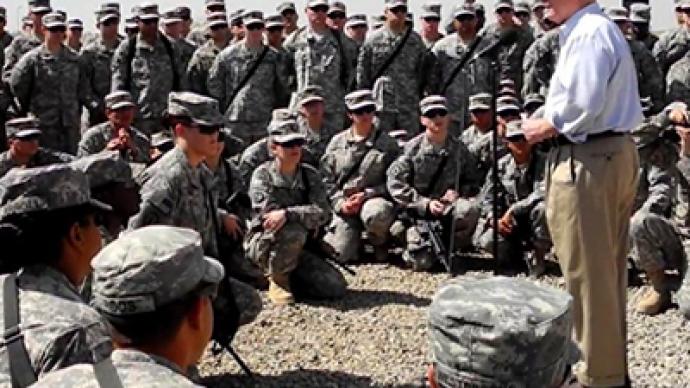Activists protest America’s $698 billion dollar military budget during Global Day Against Military Spending

Worldwide, military spending increased by $20.6 billion in 2010—and $19.6 billion of that was the US alone, according to a report just released by the Stockholm International Peace Research Institute (SIPRI).
“The US very much sees itself as a global military power, the only global military power, the only superpower and it perceives its security interests as encompassing the whole world,” said Dr. Sam Perlo-Freeman, Senior Researcher with the SIPRI Military Expenditure and Arms Production Programme at the Stockholm International Peace Research Institute (SIPRI).The US spent $698 billion in 2010: funding two wars in Iraq and Afghanistan; operating 1,000 military bases; and sites worldwide and maintaining the Pentagon’s 234 golf courses. But although 51 percent of Americans polled favored cutting military spending rather than social programs, the Pentagon is hardly on the fiscal chopping block for either Republicans or Democrats. Both Presidents George W. Bush and Barack Obama have ramped up the wars. Defense spending in the US has increased 81% since 2001. “This seems to reflect a bipartisan prioritization of military power and military conceptions of security even in the face of such difficult times,” said Perlo-Freeman. According to the Rethink Afghanistan’s War Calculator, an American worker earning the federal minimum wage, working 40 hours a week and 52 weeks a year will earn $15,080 dollars this year—well below the poverty line—and pay $505 in taxes directly to America’s wars. An American worker earning $50,000 per year will shell out well over $2,000 to the Pentagon. 51 percent of Americans polled by Reuters said they would rather cut military spending than sacrifice social programs. "The spending motivates the wars," says activist and author of "War is Lie" David Swanson, who adds that "The overwhelming majority of the population wants to end the wars," though funding for the military has almost doubled in the last decade without an enemy to justify it.The author notes that even if the US' military budget was cut by 85 percent, America would still have the highest-funded armed forces internationally.“If the wars are going to justify the spending, then something has to justify the wars," says Swanson. "You have to start somewhere with the justification of the whole machinery and no one has found that yet." “We need a reset button. We need true change. We need the Obama Administration to do the right thing and stop this continuous military buildup,” said Emira Woods of the Institute for Policy Studies in Washington DC. “There’s an imbalance when libraries are closing, you’re laying off teachers and healthcare workers. That cannot continue on that path it’s not healthy for the US and it’s not healthy for the planet.” Protesters gathered from around the United States and across the world as part of the Global Day Against Military Spending on April 12, 2011. “We need to be taking care of our own people at home—that means children, poor women, the homeless. We need to take care of the needs of our population,” said activist Liz Hourison of Arizona. “To spend enormous amounts on Pentagon budget while every social program is being cut is just fraudulent and obscene.” Activists gathered in front of the White House said they feel betrayed by a president who was elected on promises to end wars. “We’re doing all these wars and they don’t even want us there. I’m upset with Obama,” said Jessica Chirichetti.














